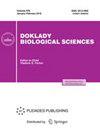Nudibranch Coryphella trophina (Bergh, 1890) (Gastropoda, Nudibranchia) Uses Twice Stolen Nematocysts for Its Defense.
Q3 Agricultural and Biological Sciences
Doklady Biological Sciences
Pub Date : 2025-02-01
Epub Date: 2025-01-22
DOI:10.1134/S0012496624600295
引用次数: 0
Abstract
Most nudibranchs feed on hydroids and anemones and utilize kleptocnidae, which are stinging capsules stolen from eaten victims, for their own defense. The nudibranch Coryphella trophina (Bergh, 1890) was found to eat other nudibranchs. Stinging capsules that the predator uses for its defense have been stolen twice: first by mollusks feeding on cnidarians and then by C. trophina eating the mollusks.
裸鳃科(Bergh, 1890)(腹足目,裸鳃目)利用两次偷来的线虫囊进行防御。
大多数裸鳃动物以水螅类和海葵为食,并利用从被吃掉的猎物身上偷来的刺囊来保护自己。裸鳃鱼(Coryphella trophina, Bergh, 1890)被发现吃其他裸鳃鱼。捕食者用来防御的刺囊已经被偷了两次:第一次被以刺胞动物为食的软体动物偷走,第二次被C. trophina吃了软体动物。
本文章由计算机程序翻译,如有差异,请以英文原文为准。
求助全文
约1分钟内获得全文
求助全文
来源期刊

Doklady Biological Sciences
Agricultural and Biological Sciences-Agricultural and Biological Sciences (all)
CiteScore
1.10
自引率
0.00%
发文量
66
期刊介绍:
Doklady Biological Sciences is a journal that publishes new research in biological sciences of great significance. Initially the journal was a forum of the Russian Academy of Science and published only best contributions from Russia in the form of short articles. Now the journal welcomes submissions from any country in the English or Russian language. Every manuscript must be recommended by Russian or foreign members of the Russian Academy of Sciences.
 求助内容:
求助内容: 应助结果提醒方式:
应助结果提醒方式:


